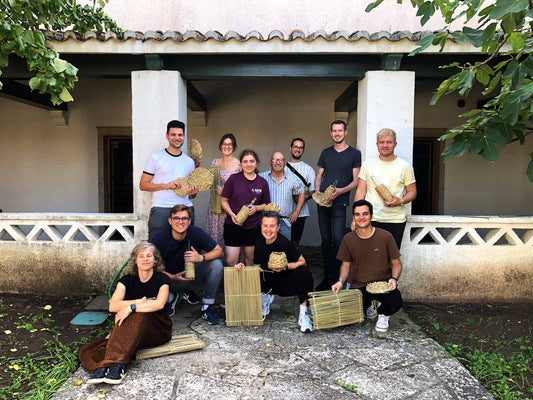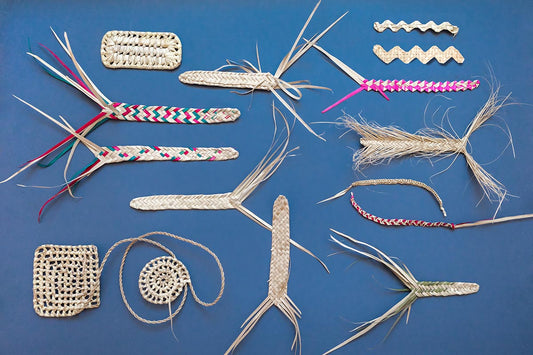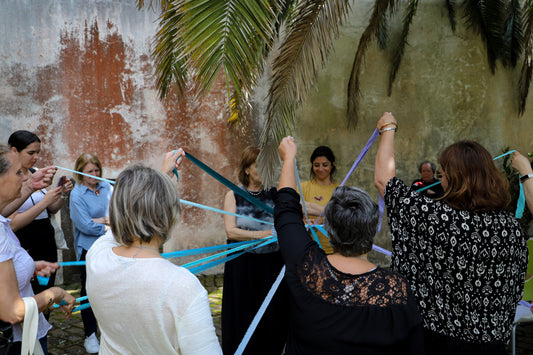Generating discussion about the contemporary recognition and appreciation of vernacular arts and crafts

The works of craftswomen, artists, or designers today seek models that resist the expectation of novelty imposed by markets. At the same time, they are aware of the importance of continuing to create responsible, clear-minded, and informed proposals that enrich daily life and shield us from alienation. In this context, handmade products are more than mere tools, as they add symbolic and emotional value to our actions, enriching them with their ancestral quality. They are the result of a conscious approach that respects the environment and promotes the intelligent use of natural resources. Furthermore, each object carries with it the knowledge and craftsmanship of many cultures and places, which gives it its timeless character.
Even so, the image of traditional arts and crafts remains caught between the memory of a bucolic past and the prototype of an ecological solution. They are misunderstood in terms of the advantages of their production scale, capacity for economic resilience, and the tacit respect they receive from people. The recurring dichotomies of "craft/design," "tradition/innovation," "handmade/contemporary" create a divide between the intellectual and the manual, contributing to the hierarchy between high culture and lesser arts. This isolates the artisanal sector and prevents it from engaging in major contemporary discussions.


The openness to the global market and the growing interest of the trend industry place pressure on workshops and artisans, delaying the promise of new viability for the artisanal sector. On the contrary, they tend to cast more doubt on its contemporary significance, making it indecipherable for consumers whether it's just exploiting the visual and morphological characteristics of these artifacts, a genuine interest in craft culture, or just a marketing strategy.
The artisanal way of making, and the new products that arise from it, promote a critical view of material culture and the values of contemporary society. They make evident the tension between the slow pace of natural biological processes and the frenetic speed of the market economy, a contrast that is tangible in our daily lives. In this way, the more traditional artisanal methods challenge the automation of industrial production, presenting original and aesthetic solutions that serve as an alternative to the visual uniformity of global trends.

One thing is certain: vernacular craftsmanship shows us that by building upon the continuity of local cultures in their balanced relationship with the landscape, it's possible to construct a healthier future for all. It's urgent to make it understood that when we choose artisanal production, we are not merely acquiring products, but also contributing to a philosophy of work and life rooted in sustainability and connection with the world around us. These objects are a celebration of our humanity and our capacity to create something of lasting and meaningful value.
The Forum Pensar o Fazer (Thinking the Making) aims to generate discussion on these issues and place the appreciation of traditional arts and crafts at the top of the agenda. The guest panels present a wide and interdisciplinary panorama of original experiences ranging from research to education and tourism, proving that artisanal craftsmanship can hold a prominent position in the cultural and economic sectors. With the engagement of participants and the audience, we want to create a space for dialogue to reflect upon and discuss sustainable proposals that continue local artisanal production as a precious common good.

The Forum also opens a temporary space to reflect upon and discuss the strengths and benefits of artisanal production and its positioning in contemporary times. It is organized into four segments that encompass various perspectives and questions:
— The first panel questions the relevance of ancestral know-how for the contemporary world. How can we learn and empower the benefits and advantages of ancient knowledge, technologies, and functionalities? How do these examples serve us in a context so different from their origins?
— The second panel gathers four fashion and home goods brands along with three Azorean artisanal production units to reflect on the joint experience of the Business Mission. What lessons were learned, what opportunities were found, and most importantly, what discoveries were made together?
— The third panel focuses on the economic viability (as well as the social and cultural aspects) of artisanal activity today, posing the question: how can these social, cultural, and ecological added values be transformed into commercial value?
— The final part of the Forum takes the form of a "reflection workshop," where the questions from each panel will be discussed in three groups. In the end, the conclusions of each group will be presented.

The Forum Pensar o Fazer (Thinking the Making) also features a nighttime program of relaxed film screenings. On the first night, two episodes of the documentary series "Designers of Brazil" will be presented, and on the second night, a set of films about artisans, resulting from the research by Tiago Pereira and Cristina Garcia for the project "A Música Portuguesa a Gostar Dela Própria".
Why the Azores?
The Azores Archipelago is a meeting point in the middle of the ocean — a favorable hub for thought, reflection, debate, and reconnection. The unique geography of the Azores offers a distinct landscape and singular raw materials. The island condition, combined with exemplary institutional work, has preserved many of the ancient practices that ensure the continuation of regional arts and crafts. The autonomous region boasts one of the most organized and comprehensive registries of artisans and UPAs (Units of Artisanal Production) in the country, with a governmental organization solely dedicated to supporting and energizing the sector. These are the ideal conditions to host the sharing and debate event envisioned by the Hands On Azores Forum. A space where the exchange of knowledge and experiences provides new perspectives on the contribution of traditional arts and crafts to the present world.
Álbio Nascimento e Kathi Stertzig



